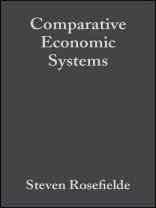Comparative Economic Systems: Culture, Wealth and Power in the 21st Century explains how culture, in various guises, modifies the standard rules of economic engagement, creating systems that differ markedly from those predicted by the theory of general market competition. This analysis is grounded in established principles, but also assumes that individual utility seeking may be culturally determined, that political goals may take precedence over public well being, and that business misconduct may be socially detrimental.
Inhaltsverzeichnis
Preface.
Glossary.
Introduction.
Part I: Systems.
1. Comparative Economic Systems.
2. Classification and Principles.
3. Culture, Politics and Ethics.
4. Power.
Part II: Perfect Economic Mechanisms.
5. Perfect Competition.
6. Perfect Governance.
Part III: Great Powers.
7. America.
8. Continental Europe.
9. Japan.
10. China.
11. Russia.
12. Transition.
13. Comparative Potential.
Part IV: Performance.
14. Measurement.
15. Global Performance.
Part V: International Relations.
16. Security.
17. Military Balance.
18. Interplay.
Über den Autor
Steven Rosefielde is Professor of Economics at the
University of North Carolina and a member of the Russian Academy of
Natural Sciences. He is actively involved in economic systems and
global security research with the American, Russian, Swedish, and
Japanese governments. He is the author of five books, and over 150
articles published in periodicals such as the Wall Street
Journal, Slavic Review, Journal of Comparative
Economics, Europe-Asia Studies, European Economic
Review, and the American Economic Review.












